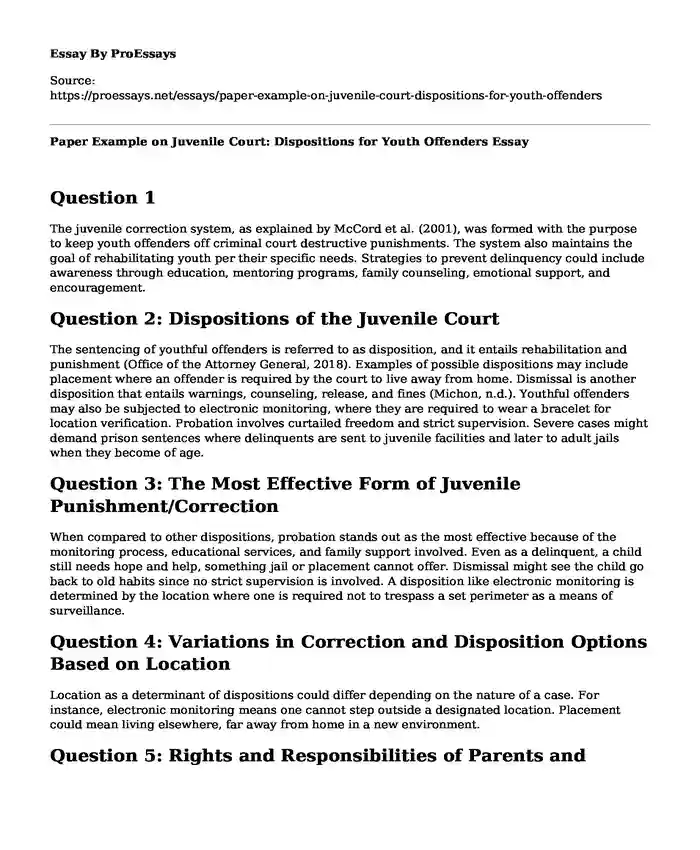Question 1
The juvenile correction system, as explained by McCord et al. (2001), was formed with the purpose to keep youth offenders off criminal court destructive punishments. The system also maintains the goal of rehabilitating youth per their specific needs. Strategies to prevent delinquency could include awareness through education, mentoring programs, family counseling, emotional support, and encouragement.
Question 2: Dispositions of the Juvenile Court
The sentencing of youthful offenders is referred to as disposition, and it entails rehabilitation and punishment (Office of the Attorney General, 2018). Examples of possible dispositions may include placement where an offender is required by the court to live away from home. Dismissal is another disposition that entails warnings, counseling, release, and fines (Michon, n.d.). Youthful offenders may also be subjected to electronic monitoring, where they are required to wear a bracelet for location verification. Probation involves curtailed freedom and strict supervision. Severe cases might demand prison sentences where delinquents are sent to juvenile facilities and later to adult jails when they become of age.
Question 3: The Most Effective Form of Juvenile Punishment/Correction
When compared to other dispositions, probation stands out as the most effective because of the monitoring process, educational services, and family support involved. Even as a delinquent, a child still needs hope and help, something jail or placement cannot offer. Dismissal might see the child go back to old habits since no strict supervision is involved. A disposition like electronic monitoring is determined by the location where one is required not to trespass a set perimeter as a means of surveillance.
Question 4: Variations in Correction and Disposition Options Based on Location
Location as a determinant of dispositions could differ depending on the nature of a case. For instance, electronic monitoring means one cannot step outside a designated location. Placement could mean living elsewhere, far away from home in a new environment.
Question 5: Rights and Responsibilities of Parents and Guardians on Dispositions
Guardians and parents are entitled to certain rights and responsibilities in terms of dispositions. They have a right to sufficient notice, sufficient opportunity to be heard and right to private personal communication with the child. Duties may include the provision of identification for their future location in case of necessary enforcement proceedings (Office of the Attorney General, 2018). Parents and guardians are crucial when it comes to solving delinquent cases; hence, it is necessary to involve them as much as possible.
References
McCord, J., Widom, C. S., & Crowell, N. A. (2001). The juvenile justice system. In Juvenile crime, juvenile justice (pp. 1-384). Washington, DC: National Academy Press. https://www.nap.edu/read/9747/chapter/7#155
Michon, K. (n.d.). Juvenile Court Sentencing Options: Typical punishment and penalties for juvenile delinquents and youth offenders. https://www.nolo.com/legal-encyclopedia/juvenile-court-sentencing-options-32225.html
Office of the Attorney General (2018). 2018 juvenile justice handbook [pdf]. https://www.texasattorneygeneral.gov/sites/default/files/files/divisions/juvenile-justice/JuvenileJusticeHandbook.pdf
Cite this page
Paper Example on Juvenile Court: Dispositions for Youth Offenders. (2023, Apr 24). Retrieved from https://proessays.net/essays/paper-example-on-juvenile-court-dispositions-for-youth-offenders
If you are the original author of this essay and no longer wish to have it published on the ProEssays website, please click below to request its removal:
- Cost or Benefit of Sustaining Life Paper Example
- Ethics and Ethical Decisions in Business Essay Example
- Engineering Communication Paper Example
- Essay Sample on Impact of Social Media on Young Person's Future
- Affordable Care Act and Patient Advocacy Essay Example
- Essay Sample on The African Americans: A History of Hard Work & Perseverance
- Essay Example on Improving Interpersonal Perception: Passive & Active Perception







